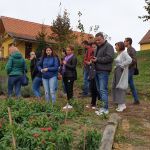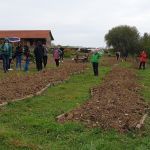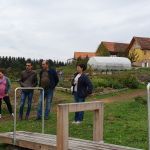EcoGard - growing with learning difficulties
The ECOGARD project aims to improve the qualifications of people with learning difficulties in organic vegetable gardening. It has created a course for teachers on how to train students including those with learning/cognitive disabilities in becoming experts in ecological vegetable gardening. It also supports students with learning disabilities in acquiring and developing key skills to improve employability and entrepreneurship. Participation of learners was supported through remote learning to improve accessibility, especially for those learners with disabilities who cannot physically attend a face to face training sessions.
Website
Useful links
Country
Media
Useful links:
In the UK, Thrive offer training and support for those using social and therapeutic horticulture to support green care
The RHS offer hints and tips for gardening with special educational needs (SEN) students
* TOP TIP *
'Link up with an organic farm to find out how this method of farming helps to solve climate change'
How is the project linked to climate change and sustainability?
The project covers issues related to ecological and organic agriculture. In terms of climate change, agriculture’s role is twofold: it is a sector that contributes to climate change, yet it is also one of the first sectors to suffer from climate change, as do the people whose livelihoods depend on it.
Who is involved?
The project involves the following participants
• trainers in area of (organic) vegetable gardening
• teachers who want to introduce Eco-vegetable gardening in their curricula
• students with learning/cognitive disabilities (minimum age 16 years)
• schools with gardening in their training profiles
• small enterprises active in ecological gardening
Beneficiaries:
• Employers, small businesses and unions
• NGOs representing people with disabilities
• Governmental educational institutions in the field of agriculture
• Wider community (society) as final received of eco-vegetable gardening production.
How are the participants involved?
Vocational education teachers are trained in mastering the concept of inclusive ecological vegetable gardening. Students can then participate and become experts in their own right, and even demonstrate their skills to other schools. The project raised awareness among young people of new entrepreneurial initiatives, embracing organic growing as well as the employment of people with disabilities.These ecological vegetable gardening initiatives can be provided by trained experts to schools (primary and secondary), and also vocational education centres, thus stimulating young people in this growing market.
Key steps:
There are many sources of information on organic growing online and through specialist organisations that can offer support in this area. The ECOGARD project developed and implemented the following steps that can be replicated elsewhere:
1. Developing a 'train the trainer' course curriculum and training handbook on the provision of ecological (organic) vegetable gardening training for trainer/teachers.
2. Delivering a training course on ecological vegetable gardening for the students with learning disabilities
3. Producing an illustrated eco-vegetable gardening handbook
4. Creating social entrepreneurship skills guidelines to support what is required by employers
5. Develop a job profile for organic growing employees
6. Providing remote learning through an accessible mobile learning application for tablets/online




